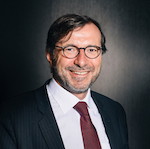
Optimising the capacities of the European Gas Network : Electrification as a quick answer, coordination of network operators as a support.
All sectors of the economy have to contribute to achieving EU ambitions to reach carbon neutrality by 2050. To do so, the European Commission has always pledged that electrification first should be the main driver. This position has always been endorsed by E.DSO Members. However, in some sectors where it is hard-to-abate to ensure a full transition to decarbonised electricity1 (industry, maritime…) low-carbon and renewable gases will be needed for a transition time.
The invasion of Ukraine and the energy prices increase call for a rapid EU independence from fossil fuel energy that is mainly imported from foreign countries. Electrification is a quick answer to all of these emergency situations. Renewable and decarbonised electricity will contribute to decrease GHG emissions while increasing EU strategic geopolitical autonomy. European Commission’s REPowerEU plan aims to achieve these objectives by saving energy, boosting renewables and investing in tomorrow’s energy infrastructure.
DSOs’ role is to accompany energy policies and adapt their networks accordingly. Indeed, they will concretely address those issues by connecting RES to increase renewable energy targets and solar rooftop PVs on buildings However, the fast implementation of heat pumps, renewable energy sources and EV chargers to the grid require targeted investments to the relying infrastructure.
For this reason, E.DSO warmly welcomes the additional 29billion € in electricity grid announced by the European Commission.
Representing the leading DSOs in Europe, E.DSO strongly defends this position in favour of electricity but also believes cooperation is needed, even essential, in some Member States. Of course where gas cannot be dramatically shortly reduced. Cooperation between gas and electricity network operators must not be detrimental to the integration of enormous shares of renewable energy, the deployment of electro mobility and the decarbonisation of buildings, allowing consumers to definitively leave fuel, and efficient management of energy consumption thanks to smart meter data…
Considering the growing role of DSOs to address the energy transition goals, the official launch of the EU DSO Entity in June 2021 was a real milestone.
A merged organisation with gas DSOs as considered in the Gas Regulation is not an efficient solution as upcoming challenges for both energy carriers are obviously not the same. A similar model to ENTSO-E and ENTSO-G, with a mirroring, separate entity dedicated to gas DSOs must be adopted.
When it comes to the Gas Directive proposal2 to reinforce cooperation between network operators and the development of joint scenarios. It also acknowledges the growing role of distribution system operators and allow a visibility of the needed investments in the electricity grid.. In Europe, there is not a “one size fits for all” and the share of gas and electricity is not the same everywhere. In some areas where cooperation will be still required, it must first and foremost take place at local and/or regional level because of large differences between urban, rural and industrial structures. Joint scenarios will allow for optimised infrastructure planning and development by explicitly showing the needed investments while fostering transparency for social acceptance.
Coordination within the energy system needs innovative tools. Investments in digitalisation, interoperability, and smart grids are one of the main means to improve such a coordination.
Data plays a key role in supporting decision-making in the process of energy transition. As an example, data provided by gas and electricity meters would bring added value to consumers to assess their energy consumption, assess the efficiency or the need of renovation works or even to better manage the respective network infrastructures…
The main question all system operators ask themselves is: how can we contribute to the Green Deal objectives?
Today, electricity distribution operators are aware of their historical mission that will be fulfilled while ensuring in the same time the resilience of the networks in a more a more unstable environment with severe climatic hazards. They will allow for new connections, uses, energy efficient decisions to contribute to the ultimate target: the climate neutrality of EU continent in 2050.
_________________________
1 EU Communication on sector integration
2 Exact reference to be added




